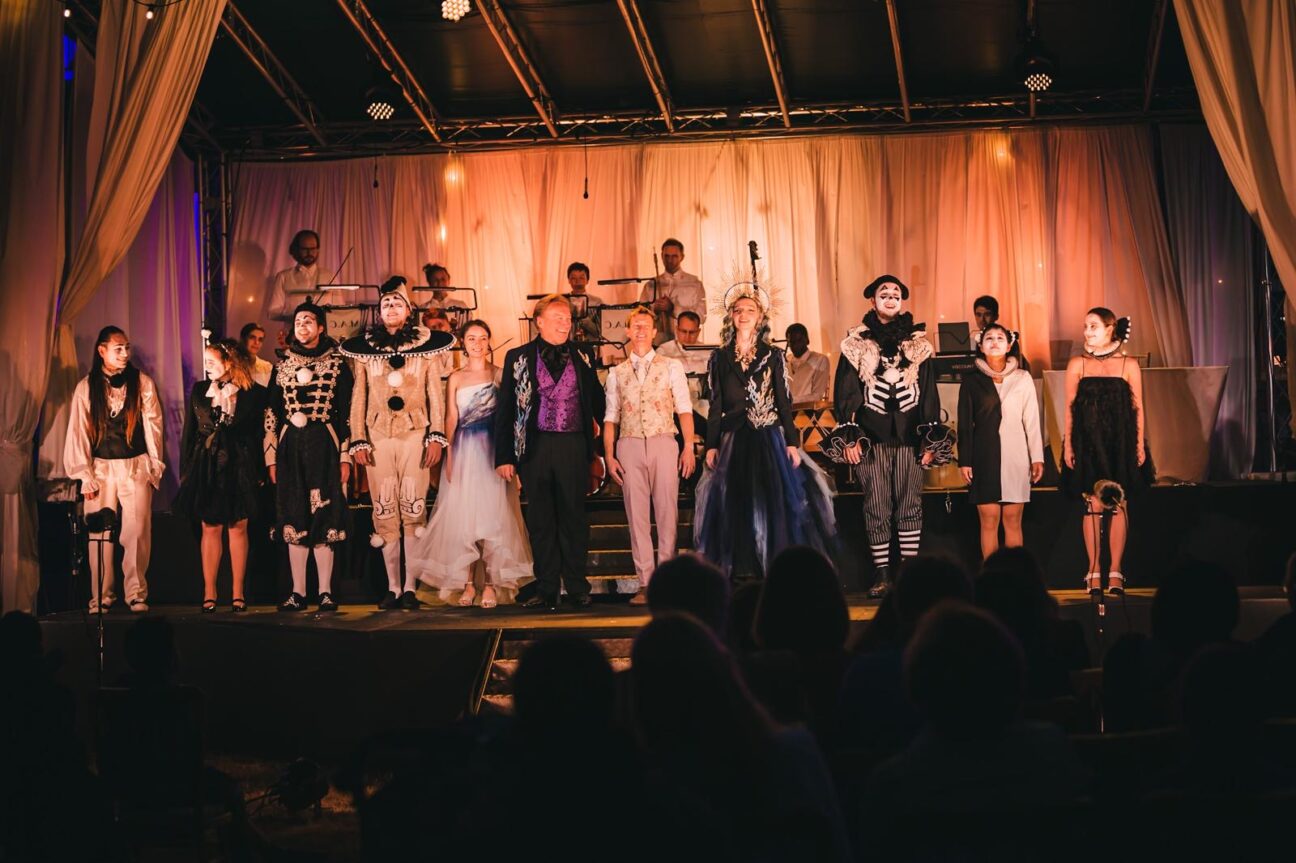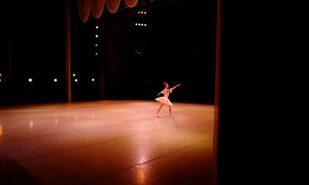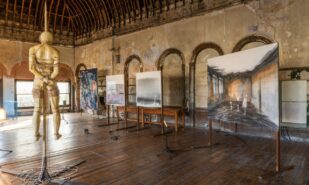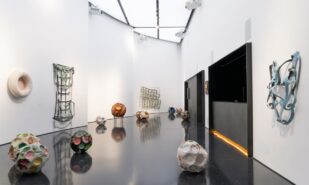London Cult. meets Betty Makharinsky, the Executive Director and Co-Founder of Vache Baroque, the project that presents Baroque opera in a unique and accessible way. We posed some questions to Betty to get insights into how this project works and what to expect from the new performances of Pergolesi’s L’Olimpiade (1735) that will be given from August 31 till September 8 at The Vache in London. Betty excitingly reveals to us how the history of the Paralympic movement will be reflected in a new production, and why it is important to bring opera to people who have never had the chance to experience it before.
“Baroque Comes Alive: Pergolesi’s ‘Olimpiade,’ ‘French Cow,’ and Music You Can Touch”

Betty, could you present your project? Vache Baroque has made three professional productions of Baroque operas since 2020. Could you say what these projects were, how it all started? Why did you decide to launch an independent project, what was the main motivation behind it?
Thank you for the question. We, myself and my husband Jonathan Darbourne, launched this project together with a few other crucial team members during the pandemic, at the height of the pandemic actually, in September 2020. And I guess the context for it was that we, along with many other freelancers working in music, and across the performing arts, found ourselves slightly at a loss for what to do. After a few months of variously practising, teaching online, reflecting on what it is to be an artist in the 21st century, we decided to grasp the opportunity when some of the restrictions were lifted in the summer of 2020 and go ahead with staging a production of Dido and Aeneas by Henry Purcell. This is one of the most famous operas of the Baroque period. It’s made up of an array of stunning musical numbers and a dramatic, gripping plot that I think is very relevant to the modern day, featuring a female ruler who’s battling societal pressures. The production that our director Tom Guthrie created actually drew on inspiration from Elizabeth I. So we had three eras in dialogue with one another – the ancient kingdom of Dido, Queen of Carthage, the kingdom of Elizabeth I which more or less fits the era of the music, and the modern day. It was a very special show – I sang the role of Belinda alongside some really brilliant singers who we were very lucky to collaborate with, including mezzo-soprano Katie Bray. We had a brilliant director, brilliant designer, and I guess because it happened during this strange 2020 window of not very much going on, we managed to capture the attention of some major newspapers and get some great reviews, as well as to sell out two performances. And that paved the way for starting an organisation, which a few months later we incorporated as a charity, which focuses on Baroque music and making it exciting, accessible, relevant to the 21st century. We’ve come, I feel, a very long way in four years. We now stage an array of project formats, opera productions but also unusual concerts. We like to collaborate with artists from other disciplines. We’ve had visual arts installations. We’ve had dancers. Since that very first production of Dido and Aeneas we’ve collaborated with a dance troupe called BirdGang Ltd. We think they’re amazing, a really special group of creatives, it’s always joyful to collaborate with them. We have worked with a theatre troupe called Out of Chaos, we’ve collaborated with a local museum – Milton’s Cottage. We’re aiming to make a name for ourselves as a company that’s quite experimental within the world of Baroque music. Most recently we actually did a project in collaboration with a multi-sensory company called BitterSuite. They experiment with multi-sensory musical projects, exploring how blindfolding audiences can allow them to better connect with their other senses by removing what is for most people their dominant sense – sight – from the process of experiencing music. That was a really special project. I wasn’t expecting for it to be so moving for our audiences. Some people were taking off their blindfolds in tears. We received really beautiful testimonials from audience members coming to see it who are blind or visually impaired too. We also had some blind and visually impaired singers involved in the project. All this is to say that our primary goal is to present this beautiful music that we are obsessed with, that we think is really inspiring and uplifting and life enhancing, in a way that is relevant and accessible.

Do you think that you are trail blazers or are there in the UK, Europe or in the US companies who are close to you by format, especially in the Baroque music? Could you name some reference theatre or opera companies that we could group together with you in the world of opera productions? Or are you special in this field, the first ones to present the Baroque opera in this way?
What I love about the world of Baroque music, and especially in how it is happening today across Europe and in the States, is that it is a genre of music that encourages musicians, players, singers, directors to be very inventive and experimental. For example, firstly, the fact that most baroque scores are underpinned by a simple bassline with numbers written underneath (called Figured Bass) automatically creates hundreds of possibilities of playing and improvising around the same notes. So there’s this intrinsic factor of experimentation within the musical material itself. Secondly, there’s a lot of research in and around Baroque music performance. You often meet instrumentalists who have done academic research, digging around to find new repertoire and trying to find information about historical performance practices, learning how that music might have been presented in the 1600s and in the early 1700s, when the premieres were happening and the composers were conceiving this repertoire. The musical material itself offers a fertile ground for being inspired to create something a little bit different and a bit experimental. Then there are a number of organisations in the UK and in Europe and the US that I really admire. We’re still starting out, we’re in year four of our existence. I wouldn’t dare to be so bold as to say that what’s happening elsewhere isn’t also brilliant. However, I think I can confidently say that what we’re doing, particularly across our education and outreach work, is quite trailblazing. We did a version of our recent multi-sensory project for a group of deafblind young people that was commissioned by the local council. We collaborated with the council’s special educational needs and disabilities specialist teaching team. Everybody I’ve described that element of our work to has said that they’ve never heard of anything like it happening. The reaction from the young people was quite staggering and really exciting. For us that felt like a really big step change in the impact of our work as a charity. We love to create music for everybody, but I think it’s particularly exciting to bring it to young people and particularly disabled, deafblind young people who otherwise would not get to experience it. That felt like a really magical morning when we did that project. So in a word, I’m a bit nervous to brand all of our work as trailblazing, but we’re working really hard to come up with new formats and to find ways in which to connect with completely new audiences. That workshop in collaboration with the multi-sensory impairment specialist teachers marked the beginning of a longer term collaboration. We loved working together, they were really excited to work with us, and we are planning a tour of that project within the next few years.

It is interesting that you mention unusual locations and unusual ways of experiencing Baroque music, as when I think of Baroque it is theatres like The Théâtre des Champs Élysées that come to mind. Such ‘normal’ and famous locations for hearing Baroque music would not have worked for your project. My question is where do you usually produce your operas and are you open to places like hangars or cafes or schools, or do you need a particular place for your opera to function?
As for traditional venues of Baroque opera or perhaps opera more generally, there’s a prominent narrative right now that for lots of people those sorts of environments are too austere or too formal somehow. I should clarify that I personally love going to the theatre and I love the Royal Opera House, I love going to see plays in proper theatres. I think there’s something wonderful about a space that’s been purpose-built to experience art. But I have realised that I am speaking from a position of privilege as somebody who has had a lot of exposure to the arts and who has had a lot of practice sitting still for a long time listening and engaging with musical or theatrical material. Our main motivation behind the Vache Baroque project is trying to be a little bit more inventive about format and location. I love the idea of performing in a hangar or in a warehouse, outdoors, in very small spaces, in private homes where you get that amazing intimacy of singing to people right in front of you. My main motivation behind that is connecting to new audiences and sharing this sort of musical and theatrical material for the first time, getting people to cross that very important threshold between never listening to opera and never listening to Baroque music, and then for the first time engaging with it and thinking ‘Oh, that’s really cool, I think that’s very beautiful, I want to do that again’. So I am not personally against ‘normal’ theatres, I love going there, but I think it is very important that arts organisations and ensembles work really hard to make themselves relevant. If that means reinventing the format or programming in a completely different way, or if that actually even just comes down to branding and marketing and listening to what people want to happen before or after the performance… I think this is one of the big conversations happening right now in the classical music production space – that companies aren’t working hard enough to figure out what audiences want and need to to come for the first time and then to keep coming back. That is something I really care about because I think it’s an amazing world that I want more people to derive inspiration and pleasure from.

Could you describe your current project for Pergolesi’s L’Olimpiade. I was surprised that 50 composers have tried to set this libretto to music. Could you tell us more about it? How did you make the choice to put this opera on? What were the dates of its production before your project?
Jonathan, our artistic director and co-founder, went digging around in High Baroque repertoire – we’re talking between 1700 and 1750. Much of the drama we have produced so far has belonged to the 17th century rather than the 18th century. He felt excited to bring a slightly different aesthetic to our existing audiences, the people who’ve come to see our previous three opera productions. And within his research, he came across this libretto, L’Olimpiade, which is pretty much completely forgotten today. And it doesn’t quite make sense why, because it was one of the most popular librettos in the Baroque period. Antonio Vivaldi set it to music, too, and actually the Royal Opera House in London staged Vivaldi’s version this May. If any of your readers went to see that, I think it could be a particularly interesting contrast to experience completely different musical material by Pergolesi, an opportunity to compare how these two great composers set the same story. Then connected to the fact that Jonathan wanted to pick an opera from the later part of the Baroque period, he was inspired by the fact that Buckinghamshire, the county where our opera festival was based, was the birthplace of the Paralympic movement – a big hospital in Stoke Mandeville, which is just a short journey from The Vache, was where the Paralympics were first born. And that legacy in Buckinghamshire, in combination with the fact that it is an Olympic and a Paralympic year in Paris inspired us to choose this piece. Coming back to our desire to present Baroque music in a slightly unexpected and hopefully accessible and engaging way, we thought that an Olympic-themed opera would be perfect for creating a world before the actual opera production happens which features lots of different Olympic and Paralympic sports for people to try and to read about, and to see little demonstrations of. That, in a nutshell, was the process of choosing this piece. Most importantly, I should add that the musical material by Pergolesi is thrilling – I can’t emphasise this enough. It’s a really exciting piece to discover. It is something very energising to experience as an audience member because we have seven singers on stage and all of them have a chance to sing these Baroque arias which feature lots of fast runs (coloratura) which I think is one of the key things new audiences find exciting. It is really impressive hearing people sing very loudly in an unamplified way, but all the same manoeuvre their voices around very dynamic passages that go high to low in very quick succession. It really feels electric to listen to that.
What should people who will go and see this opera do to best prepare for this new production so as not to miss the important things? Should one watch some films about this period and the lives of the Baroque opera singers like Farinelli (1994)?
I honestly think that beyond coming to Vache Baroque with an open mind and a readiness to engage during the show, I don’t think people need to prepare at all. You could perhaps listen to other music by Pergolesi – his ‘Stabat Mater’ is his most famous work. He died tragically young, at the age of 26, so the fact that he managed to write a number of operas and lots of other large-scale works is pretty astounding. This opera is nothing like the Stabat Mater, it has a completely secular storyline featuring love, disguise, friendship, misunderstanding, competition, the royal court, the well-meaning pressures of King Clistene on his daughter, Princess Aristea. As the recitatives have been replaced with a new English script by our director Laura Attridge, audiences should be able to follow the story really well. Maybe another thing you could do is read the synopsis that’s available on Wikipedia beforehand, just to start to familiarise yourself with the characters that you might see on stage. Also, we encourage our audiences to arrive at 3pm in the afternoon, when we open our grounds, to experience our sports and sound installations. We like to bring the world of our operas to life before the main show, during which there’s plenty of time to read the synopsis and the program notes before entering the world of Pergolesi at 7pm.
Could you describe the accessible performance on September 7? What would be different in it and who might want to choose this performance?
I am super excited about the relaxed performance, it is the first time we have ever produced a show in this format. It feels like another exciting step change in our work as a musical charity. There will be a presenter or MC on stage leading our audience through the show and introducing each piece and encouraging everyone to get involved. It will be perhaps less of an operatic show and more of a presentation of what an opera is. The MC will introduce the instruments of the orchestra. They will lead some participatory singing activities. The idea behind the relaxed performance is to create a space where very young children or anybody of any age with neurological conditions or movement disorders or the need to make noise and stand up and walk around could enjoy the opera. We also have in mind older people or brand new audiences who might find it restrictive to sit still for a long time. We really want anyone to feel comfortable to come and experience this performance without the usual rules of theatre-going. They can kind of dip in and out of it, they’ll be able to leave the main performance space for a separate, quiet relaxing space elsewhere in the grounds if they become overwhelmed. We certainly want to welcome families with very young children and babies of any age. Ultimately it’s for anyone that wants to try opera for a very accessible price and in a very relaxed way, to see this thrilling form with super polished and highly trained singers with orchestra without committing a whole evening to it.

Betty, I know you as a singer. I wonder if you also double your roles as you did in the performance of Dido and Aeneas, being the singer and the executive director at once.
I feel as the scale of our project grows it makes sense for me to be present just in the role of manager, producer, and organiser so that I can help our team to look after the audiences, but also to support the performers and creatives involved in the production. It feels right to separate these two roles for now, but I’m still doing a lot of singing elsewhere. When we perform as a collective at other festivals or in other venues, I gladly join as a singer. That is my primary vocation and a real passion. I feel very lucky to be able to do that as a career, but equally I derive a huge amount of satisfaction from platforming other singers, facilitating space for other creators to create something that they feel really proud of.

Betty, why Vache? It means ‘cow’ in French. Why such a combination for a collective? It draws your attention but you never know why it is called this. It seems to be a mix of the unmixable because Baroque doesn’t necessarily have the cow as an association with it.
You’re absolutely right. The name Vache Baroque comes from the venue where we do our summer festival; that name of the house and estate dates back to the Domesday Book. It was actually spelt differently then – Vaccha. Over time as these things do, language has shifted and adapted, and it has become the Vache. As far as I know there’s no association with cows in terms of what the house is actually called, but when we first decided to put on that production of Dido and Aeneas, it occurred to us that the name could help us out by being a little bit cheeky, something memorable and light hearted. I’ve certainly found that to be the case – we get lots of questions about it and it sticks in people’s minds, I think it fits our brand. As I say, with the highest respect for the musical material and for everything else that’s going on in the industry, we are trying to find new ways to collaborate with creatives and audiences, and to be at the forefront of continuously interrogating the audience experience. We think of how we can present music and baroque opera in a way that is extra accessible, unusual and memorable, and I think ‘French Baroque cow’ fits that aesthetic and mission pretty well.




